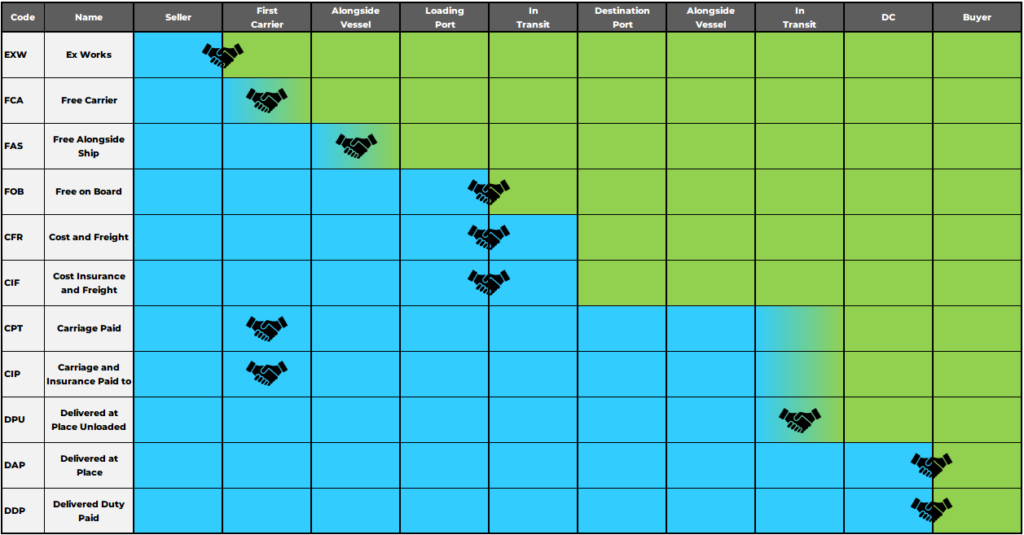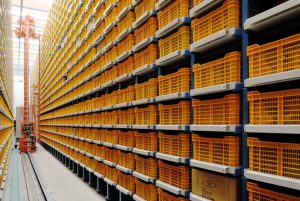Incoterms are a fundamental element of trade between two parties, defining where risk, cost and responsibility sites between the buyer and seller. BoxLogic Logistics Consultants have created this guide to explain what Incoterms are as well as how and why they are used. If you are looking for support in developing your logistics and supply chain operations, then get in touch with our consulting team here.
What are Incoterms?
Incoterms are short for International Commercial Terms. They are set out by the International Chamber of Commerce (ICC) to create consistency and avoid confusion between international parties when negotiating foreign trade contracts. Incoterms standardise and clarify the obligations and responsibilities of buyers and sellers while goods are in transit.
Incoterms were last updated in 2020. There are 11 incoterms in total, 7 of these are applicable to any mode of transport while 4 are only applicable to transport by sea. Displayed as universal 3 letter acronyms, they are typically followed the final destination or port of the goods being transported.
e.g EXW (named port or place)
While Incoterms are designed to communicate obligations, tasks, costs, and risk, they do not determine price, currency or contract law.
Why Use Incoterms?
Incoterms allow the buyer to determine how much control they would like when negotiating shipment terms.
For example, using the EXW (Ex Works) Incoterm places very little obligation on the seller. This allows the buyer the maximum available control over negotiating freight rates, transport, and customs clearance. This opens the buyer to optimise efficiencies within their supply chain by negotiating favourable rates and decreasing lead times. However, with the additional autonomy comes added liability, administration, and risk.
If the buyer does not have the capability and resource within their business to negotiate transport and customs, it may be preferable for them to select an incoterm that places more responsibility on the seller. Equally, the heightened administration and control for the seller could result in an increased cost to the buyer.
It is therefore of great importance that your business selects an incoterm that best suits your needs.

List of Incoterms
The list of incoterms has been split into those applicable to all transport modes and those that are just relevant to maritime modes.
All Transport Modes
The following Incoterms can be used for any mode of transport (air, sea, rail or road).
EXW - Ex Works
The transfer of risk takes place once the goods are made available by the seller.
- Seller delivers goods at a specified place for the buyer to pick up.
- Seller is obligated to help with security and documentation requirements.
- Seller is liable for obtaining the correct export documentation and clearance from the buyer.
- Buyer responsible for automated export system filing and compliance.
- Buyer arranges and pays for all transport.
FCA - Free Carrier
- Seller delivers goods at a named place.
- Seller responsible for export clearance.
- Buyer is responsible for shipment.
CPT - Carriage Paid
- Seller manages cost and processing to ship to foreign destination point of importation.
- Seller responsible for export clearance and freight costs.
CIP - Carriage and Insurance Paid
- Seller manages cost and processing to ship to foreign destination point of import.
- Seller responsible for export clearance and freight costs.
- Seller must also obtain insurance for goods in transit.
DAP - Delivered at Place
- Seller arranges and pays for delivery of goods.
- Buyer handles import clearance and unloading
- Buyer pays import duty and taxes.
- Buyer handles in-country transport.
DPU - Delivered at Place Unloaded
- Seller arranges and pays for delivery of goods.
- Seller responsible for unloading goods at the destination point.
- Buyer handles import clearance and unloading.
- Buyer pays import duty and taxes.
- Buyer handles in-country transport.
DDP - Delivered Duty Paid
- Seller delivers the shipment in a foreign country to a named place.
- Seller assumes all cost, risk and responsibility of the shipping process (inc. foreign customs clearance and potential delays).
- Sales contract states whether seller or buyer is responsible for unloading.
Maritime Only Transport Modes
The following Incoterms can only be used for maritime, or sea, based transport.
FAS - Free Alongside Ship
- Seller delivers goods to port.
- Seller responsible for export documentation and clearance.
- Buyer handles all costs after goods have been delivered to port.
FOB - Free on Board
- Seller responsible for export documentation and clearance.
- Seller responsible for terminal charges and risk.
- Buyer responsible once the goods have been loaded to the shipping vessel.
CFR - Cost and Freight
- Seller delivers goods.
- Seller pays for transportation to the foreign countries port.
- Risk transfers to buyer once the goods are on the vessel.
CIF - Cost, Insurance and Freight
- Seller delivers goods
Risk transfers to buyer once the goods are on the vessel. - Seller pays for transportation to the foreign countries port.
- Seller provides insurance for goods while in transit.
Summary
Incoterms are an important element of trade, clearly assigning roles and responsibilities to the buyer and seller of any relationship. Of the 11 different incoterms, the most commonly used Incoterms are EXW (Ex Works), FOB (Free on Board), CIF (Cost, Insurance and Freight), DDP (Delivered Duty Paid), FCA (Free Carrier) and CFR (Cost and Freight).
BoxLogic support businesses to make informed decisions and design optimised solutions in their supply chain and logistics operations. Speak to one of our supply chain consultants today if you are reviewing your supply chain setup to find out how we can support your change projects.



